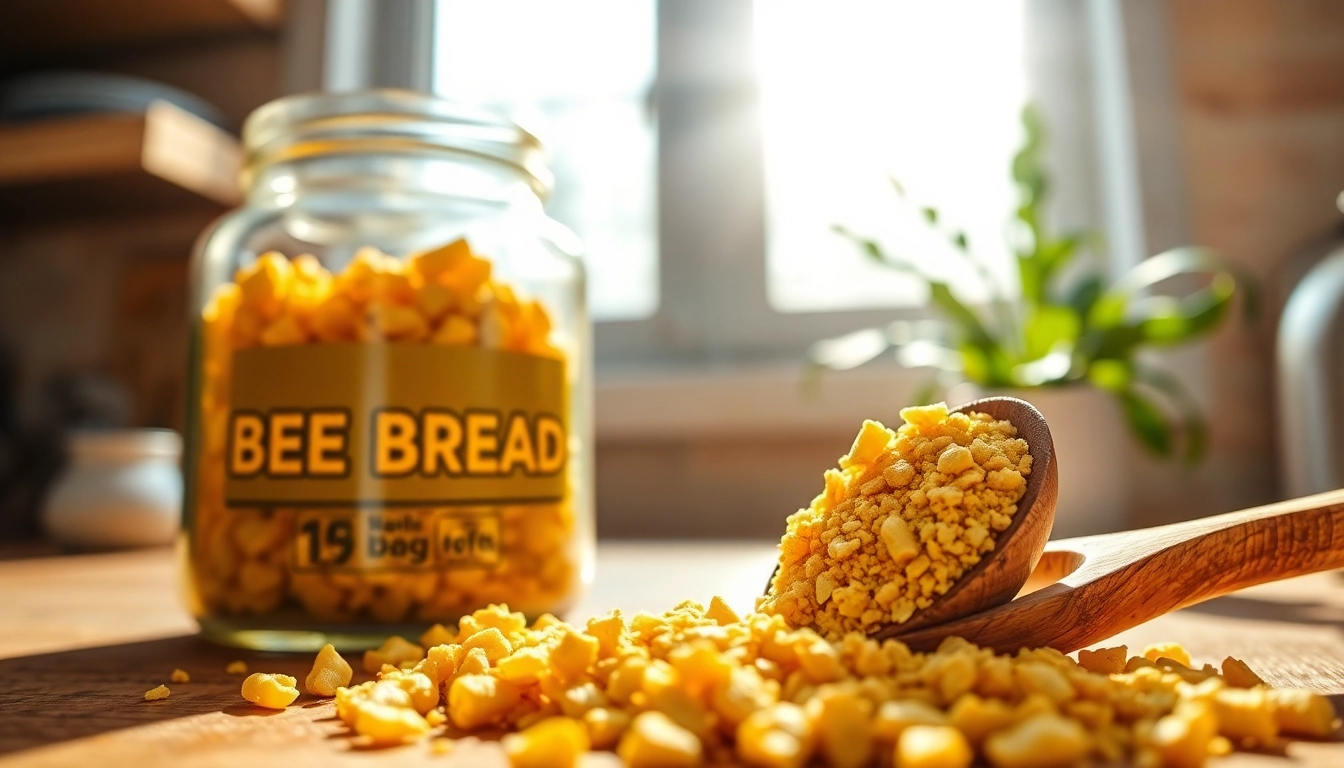1. Understanding Bee Bread Supplements
In recent years, there has been a noticeable surge in consumer interest surrounding natural dietary supplements. Among them, bee bread supplements have become a focal point for those seeking to enhance their health and wellness. These unique offerings, derived from a combination of pollen and honey, boast an impressive nutritional profile and a myriad of health benefits. In this comprehensive article, we will delve into what bee bread is, its nutritional composition, and how it stands apart from other supplements available in the market.
1.1 What is Bee Bread?
Bee bread, also known as perga, is a natural product created by honeybees through a unique fermentation process. It consists of pollen that is collected from flowers, mixed with honey and enzymes from bees’ salivary glands, and stored in honeycomb cells to ferment. This innovation is not trivial; it makes bee bread one of the most biologically active and nutritious substances produced by bees. The fermentation process breaks down the cell walls of the pollen grains, making the nutrients more bioavailable, thus enhancing their digestibility and absorption in the human body.
1.2 Nutritional Composition
The nutritional profile of bee bread is what sets it apart from other superfoods. Rich in carbohydrates, proteins, vitamins, and minerals, bee bread provides a well-rounded selection of nutrients to support overall health. Key components include:
- Proteins: Bee bread contains approximately 25-30% protein, which includes all nine essential amino acids necessary for human health.
- Vitamins: It is rich in B vitamins (such as B1, B2, B6, and B12), vitamin C, and vitamin E, all of which play vital roles in energy production, immune function, and skin health.
- Minerals: Significant levels of essential minerals such as zinc, magnesium, calcium, and iron, which are crucial for various bodily functions, including bone health, immune support, and oxygen transport in the blood.
- Antioxidants: The presence of flavonoids, carotenoids, and other antioxidants helps combat oxidative stress in the body, potentially reducing the risk of chronic diseases.
1.3 How Bee Bread Differs from Other Supplements
While there are many dietary supplements available today, bee bread distinguishes itself in several key ways. Unlike synthetic vitamins and powders, bee bread is a whole food product, meaning it retains its natural balance of nutrients and bioactive compounds. Moreover, its unique fermentation process enhances the absorbability of these nutrients, setting it apart from traditional pollen supplements. Additionally, bee bread’s combination of nutrients may work synergistically, providing holistic health benefits that isolated nutrients often cannot match.
2. Benefits of Bee Bread Supplements
The benefits of incorporating bee bread supplements into your dietary regimen are extensive. From boosting your immune system to enhancing cognitive function, bee bread offers a myriad of advantages that can promote overall well-being.
2.1 Immune System Support
One of the most well-documented benefits of bee bread is its ability to bolster the immune system. The rich array of vitamins and minerals, particularly vitamin C and zinc, are essential for the synthesis of immune cells and the effective function of immune responses. Studies have shown that regular consumption of bee bread can enhance the body’s defense against infections and illnesses, making it an excellent addition for individuals seeking to improve their immune resilience.
2.2 Energy and Vitality Boost
Many users of bee bread supplements report increased energy and vitality. This can be attributed to its rich nutritional profile that supports cellular energy production. The B vitamins present in bee bread play a critical role in the conversion of food into energy, while the presence of amino acids contributes to muscle recovery and endurance. Athletes and active individuals often turn to bee bread not only for its energy-enhancing properties but also for its ability to help improve recovery times after strenuous activity.
2.3 Cognitive Function and Memory Enhancement
Emerging research suggests that bee bread may offer cognitive benefits, particularly in enhancing memory and concentration. The presence of omega-3 fatty acids, combined with antioxidants and polyphenols found in bee bread, may contribute to improved cognitive function. Some studies propose that these compounds could play a role in reducing the risk of neurodegenerative diseases and promoting healthy brain aging.
3. How to Incorporate Bee Bread into Your Diet
Incorporating bee bread into your daily routine can be both simple and enjoyable. With various consumption methods available, you can choose the ones that best suit your tastes and lifestyle.
3.1 Recommended Dosage and Serving Suggestions
When it comes to dosage, bee bread supplements are typically available in several forms, such as capsules, chewables, or powder. The recommended dosage can vary by product, but a common guideline is to consume 1-2 teaspoons of bee bread daily if using the raw form or 2-3 capsules of concentrated extracts. Always consult the specific product label for serving suggestions, and consider speaking with a healthcare provider, especially if you are pregnant, nursing, or on medication.
3.2 Recipes Featuring Bee Bread
Bee bread can be seamlessly integrated into various dishes. Here are a few simple ideas:
- Smoothies: Add a teaspoon of bee bread to your morning smoothie for an extra nutrient boost.
- Breakfast Bowls: Sprinkle bee bread over yogurt or oatmeal for a crunchy texture and added nutrition.
- Baking: Incorporate bee bread into your baking recipes, such as pancakes or muffins, to enhance their nutrient content.
3.3 Pairing with Other Nutritional Supplements
Bee bread can work well alongside other nutritional supplements. For enhanced energy, consider pairing it with spirulina or protein powder. For immune support, it can be combined with vitamin D or echinacea, and for cognitive health, pair it with omega-3 supplements. Always consult with a healthcare professional before combining supplements to ensure compatibility and safety.
4. Potential Side Effects and Considerations
Though bee bread supplements are generally well-tolerated, it’s crucial to be aware of potential side effects and considerations to maximize safety and effectiveness.
4.1 Allergies and Sensitivities
Individuals with allergies to pollen or bee products should exercise caution when considering bee bread. Symptoms can range from mild reactions to severe anaphylactic responses. A patch test or consultation with a healthcare provider is recommended before introducing bee bread into one’s diet.
4.2 Interactions with Medications
There is limited research on the interactions between bee bread supplements and medications. However, because its components may influence blood sugar levels or immune responses, individuals taking medications for diabetes, blood pressure, or autoimmune conditions should consult a healthcare professional to avoid potential complications.
4.3 Best Practices for Safe Usage
To ensure safe usage of bee bread supplements, consider the following tips:
- Start with a small dose to assess your tolerance before gradually increasing.
- Choose high-quality products from reputable brands to avoid contaminants.
- Always consult a healthcare provider if under medical care or taking other supplements.
5. Choosing Quality Bee Bread Supplements
With the plethora of bee bread supplements available on the market, choosing a high-quality product is essential for reaping the maximum health benefits. Here are key factors to consider while making your choice.
5.1 How to Read Labels Effectively
When evaluating bee bread supplements, pay close attention to product labels. Look for information on:
- Ingredients: Ensure that the product contains pure bee bread without unnecessary additives or fillers.
- Nutritional Information: Check for the amounts of key nutrients, including proteins, vitamins, and minerals.
- Production Methods: Opt for products that are made using cold-press or freeze-dry methods, which help preserve the nutrients.
5.2 Top Brands in the Market
Some of the reputable brands known for their quality bee bread supplements include NutriRise, Herbalife, and Bee Pollen Granules. Be sure to research customer reviews and third-party testing results to ensure product reliability.
5.3 Customer Reviews and Testimonials
Before making a purchase, take the time to read customer reviews and testimonials. These insights can provide valuable information on the product’s efficacy, taste, and any notable side effects experienced by other users. Look for products with consistently positive feedback to inform your decision.














Leave a Reply